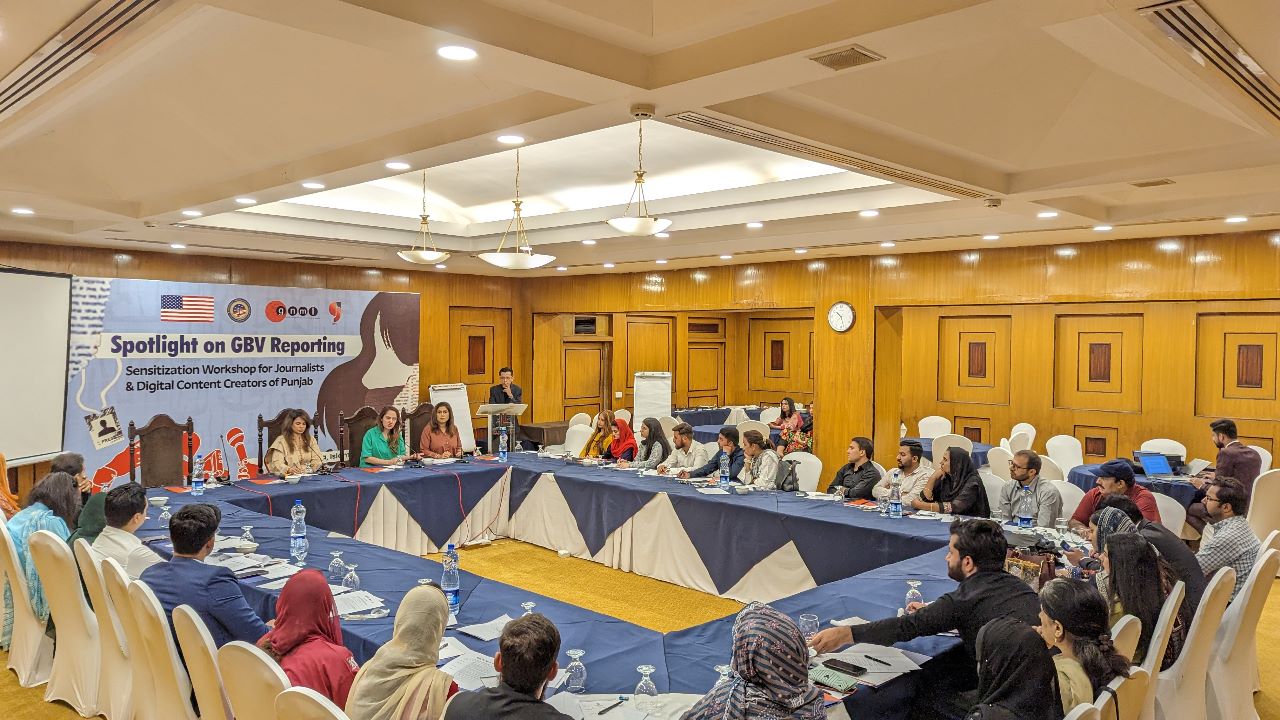By: Asim Nawaz
ISLAMABAD: In collaboration with the Bureau of International Narcotics and Law Enforcement Affairs (INL), the Global Neighborhood for Media Innovation (GNMI) is currently organizing a series of workshops titled “Spotlight on GBV Reporting.” These workshops have a twofold purpose: to promote responsible reporting of gender-based violence (GBV) and to empower journalists and digital content creators in their efforts to support survivors. As a registered non-profit organization, GNMI is dedicated to bridging the gap between media, civil society, and diverse communities through initiatives such as media literacy, capacity-building, and advocacy.
The “Gender Justice (Gen-J) Program” initiated by GNMI aims to raise awareness among journalists and digital content producers in Punjab about Gender-Based Violence (GBV). Through this program, GNMI also strives to increase public awareness regarding the prevalence of GBV and the response mechanisms available in Punjab. The Program Inauguration, held in Islamabad on May 27, 2023, focused on equipping local media professionals in Punjab with enhanced skills and capacities to deliver more precise and empathetic coverage of GBV.
Najia Ashar, President of GNMI, presented welcome remarks to esteemed guests and participants and emphasized the prevalence of gender-based violence (GBV) and the crucial role that media plays in reporting such cases. She stressed the importance of responsible and sensitive journalism in shedding light on GBV incidents, raising awareness, and giving a voice to survivors. Ms. Ashar elucidated the need for media professionals to actively engage in reporting on GBV, contributing to the collective efforts in combating this pervasive issue and promoting social change. Senior journalist Gharidah Farooqui highlighted the importance of responsible reporting and the protection of survivors in cases of gender-based violence (GBV). Reflecting on the progress made over the past five years, Ms. Farooqui noted the transformation in how crimes against women and GBV are now considered heinous offenses, thanks to the collective wisdom of media practitioners globally. Drawing parallels to a code of conduct established in 2010 for reporting updates on the war on terror, she emphasized the need to avoid graphic imagery. She also stressed the significance of protecting the identities of GBV survivors and avoiding insensitive questions, while expressing concern over society’s regressive approach towards GBV issues. Additionally, she highlighted the underreported cases of persecution faced by transgender individuals, calling for greater awareness and sensitivity towards their struggles.
Representing the Ministry of Law and Justice, Mr. Khurram Shahzad, Director General, lamented the societal norms that hinder women’s empowerment and emphasized the significance of gender-sensitive policies in addressing GBV. He highlighted the need for comprehensive policies that protect human rights and combat violence against women, while acknowledging milestones achieved such as legislation and support services for survivors. Mr. Shahzad recognized existing gaps in policymaking and law enforcement, and he underlined the ministry’s commitment to combat GBV through policy, advocacy, and a transformative shift towards a society that rejects violence and promotes equality.
During the event, Dr. Farzana Bari, a prominent expert on gender-based violence (GBV), highlighted the significant contribution of Pakistani women in the informal agricultural sector. She revealed that the latest labor force survey indicated that 25% of women belong to the working class in the formal economy. However, women’s labor force participation in the informal economy is three times larger than in the formal economy. Dr. Bari also expressed concerns about the conviction rate for violence against women (VAW), emphasizing that it stands at less than 2%. Her insights underscored the urgent need for comprehensive reforms to address gender inequality, uplift marginalized communities, and ensure justice for survivors of GBV.
Following the Program Inauguration, a full-day workshop was conducted on ethical and holistic reporting of GBV and the manifestation of GBV laws, involving journalists and digital content creators. During the feedback session, participants asked a series of questions and emphasized the urgency of building the capacity of fellows to combat the prevalence of domestic violence and the alarming rise in GBV cases.
